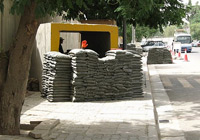USIP's Iraq program aims to reduce interethnic and interreligious violence, speed up stabilization and democratization, and reduce the need for a U.S. presence in Iraq. As part of this program, USIP has maintained a small office in the Green Zone in Baghdad since early 2004. Rusty Barber, a former political officer in the Foreign Service, has run the office since March 2007. His regular dispatches offer a lively and sobering insider's view of the promise and peril facing U.S. efforts in that country. We'll update this section each week, making only minimal changes for security reasons.
Though I have only existed in this tiny circle of Baghdad for barely 96 hours, there are an overwhelming number of sights, sounds, and smells to take in: massive slabs of reinforced concrete that have turned the IZ [International Zone] into a virtual ant farm, the clatter of weapons on tile as soldiers lay them down to eat in the mess, the pervasive friendliness, the occasional thump of an incoming rocket and, more rarely, the desk-rattling car bomb belatedly followed by the "Big Voice" alerting residents to the presence of danger:
LOCKDOWN! LOCKDOWN! LOCKDOWN! UNIFORM POSTURE U3
ATTENTION ON THE COMPOUND! ATTENTION ON THE COMPOUND!
LOCKDOWN! LOCKDOWN! LOCKDOWN!
NO OUTSIDE MOVEMENT UNLESS MISSION CRITICAL. UNIFORM POSTURE IS U3 UNTIL FURTHER NOTICE.
LOCKDOWN WILL REMAIN IN EFFECT UNTIL LIFTED BY G-3.
Image on left: Entry to Freedom Compound, home to USIP's Office
 We clamber onto the roof to try to identify the location of the blast. A plume of smoke not far beyond one of the IZ entry points provides the answer. That plume means one of our Iraqi staff will not make it in for the meeting that day. He will instead spend the afternoon in lockdown as his neighborhood is cordoned off and searched. Almost everyone else makes it in, however, smiling, welcoming—curious about the new face they will have to get used to for the next twelve months. One is immediately struck by the time, effort, and courage it takes each of them to make it through the heavily guarded—and dangerously jumpy—checkpoints to get to our office.
We clamber onto the roof to try to identify the location of the blast. A plume of smoke not far beyond one of the IZ entry points provides the answer. That plume means one of our Iraqi staff will not make it in for the meeting that day. He will instead spend the afternoon in lockdown as his neighborhood is cordoned off and searched. Almost everyone else makes it in, however, smiling, welcoming—curious about the new face they will have to get used to for the next twelve months. One is immediately struck by the time, effort, and courage it takes each of them to make it through the heavily guarded—and dangerously jumpy—checkpoints to get to our office.
We have our own little aviary filled with brightly colored (and rapidly multiplying) budgies that the military guys next door established in the courtyard. It's comforting to hear their joyful chatter in the mornings.



